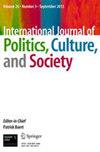Prisons of Poverty and Politics: How Russian Human Rights Workers Embed Themselves in Middle Class Social Movements
IF 1.1
Q3 POLITICAL SCIENCE
International Journal of Politics Culture and Society
Pub Date : 2023-09-29
DOI:10.1007/s10767-023-09460-3
引用次数: 0
Abstract
Abstract Human rights NGOs contribute to the formation of norms and policies around penality, and inform social understandings of what constitutes acceptable punishment. This article turns to the symbolic group-making work of human rights workers as agents who work with prisoners, and who also construct the image of the prisoner for the rest of society. I zoom in on the case of prison NGO work in Russia, a non-democratic country, and answer two questions: first, how do prison NGOs construct the image of the prisoner, and articulate their relationship with their social base and their networks of civic engagement? Second, what organizational behaviors do these articulations encourage? Drawing on 18 semi-structured interviews and observation at prison NGOs based in Moscow, the study shows that Russian NGO workers often view themselves and act as members of a middle class social movement in Russia. While NGOs tend to focus on the most economically disadvantaged and socially isolated groups in their work, the prisoners they depict when addressing the public and the press tend to represent more educated groups with higher levels of symbolic capital (political prisoners, those convicted of economic crimes, and former state employees), reflecting a desire to put prison on the middle class agenda. At the same time, prison NGO employees employ a class lens in their work with prisoners, and determine how to help prisoners based on their assessment of how the socio-economic background of the prisoner intersects with ethnicity, religion, ability/disability, region where they are serving their sentence, and region where they are from. In other words, prison NGO workers view prisoners through the resources they can accumulate using the simultaneous, intersecting dimensions of their status and their relation to other groups both in prison and outside.贫穷与政治的监狱:俄罗斯人权工作者如何融入中产阶级社会运动
人权非政府组织有助于形成有关惩罚的规范和政策,并告知社会对什么是可接受的惩罚的理解。这篇文章转向了人权工作者作为与囚犯一起工作的代理人的象征性群体建构工作,他们也为社会其他人构建囚犯的形象。我聚焦于俄罗斯这个非民主国家的监狱NGO工作,并回答两个问题:第一,监狱NGO如何建构囚犯的形象,并阐明他们与社会基础和公民参与网络的关系?第二,这些表述鼓励了什么样的组织行为?根据对莫斯科监狱非政府组织的18次半结构化访谈和观察,该研究表明,俄罗斯非政府组织工作人员经常将自己视为俄罗斯中产阶级社会运动的成员。虽然非政府组织在工作中倾向于关注经济上最弱势和社会孤立的群体,但他们在向公众和媒体发表讲话时所描绘的囚犯往往代表着受教育程度更高、象征资本水平更高的群体(政治犯、被判经济罪的人、前政府雇员),这反映了一种将监狱纳入中产阶级议程的愿望。与此同时,监狱NGO的工作人员在与犯人打交道的过程中采用了阶级视角,根据犯人的社会经济背景与种族、宗教、能力/残疾、服刑地区、出生地等因素的交集来决定如何帮助犯人。换句话说,监狱NGO工作者通过他们可以积累的资源来看待囚犯,同时使用他们的地位和他们与监狱内外其他群体的关系的交叉维度。
本文章由计算机程序翻译,如有差异,请以英文原文为准。
求助全文
约1分钟内获得全文
求助全文
来源期刊

International Journal of Politics Culture and Society
POLITICAL SCIENCE-
CiteScore
2.80
自引率
0.00%
发文量
21
期刊介绍:
The International Journal of Politics, Culture, and Society welcomes original articles on issues arising at the intersection of nations, states, civil societies, and global institutions and processes. The editors are particularly interested in article manuscripts dealing with changing patterns in world economic and political institutions; analysis of ethnic groups, social classes, religions, personal networks, and special interests; changes in mass culture, propaganda, and technologies of communication and their social effects; and the impact of social transformations on the changing order of public and private life. The journal is interdisciplinary in orientation and international in scope, and is not tethered to particular theoretical or research traditions. The journal presents material of varying length, from research notes to article-length monographs.
 求助内容:
求助内容: 应助结果提醒方式:
应助结果提醒方式:


